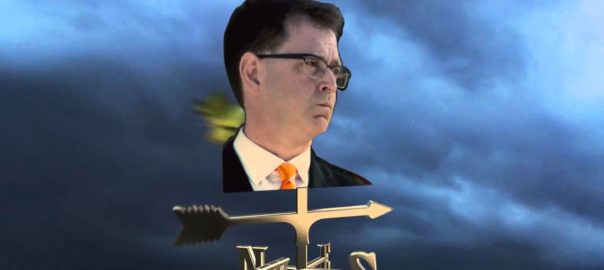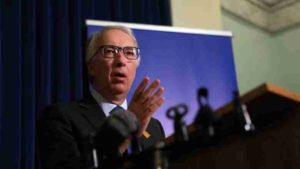
On Saturday, October 17, 2009, Danielle Smith was elected leader of the fledgling, right-of-centre Wildrose Alberta political party. At the time, Ms. Smith was one of four elected Wildrose MLAs to sit as a Wildrose member in the Alberta Legislature.
Three years later, when the Writ was dropped on Sunday, March 26th, 2012, the 2012 election date was set for twenty-eight days later, on Monday, April 23rd.
With a tired and increasingly unpopular Alberta Progressive Conservative Party in power for 41 consecutive years, and an ascendant Wildrose Party set to form government — if the polls were to be believed — a decidedly far-right-of-centre 41-year-young Danielle Smith looked forward to becoming Alberta’s 14th Premier.
Alas, that was not to be.
Although the 2012 campaign Danielle Smith and her Wildrose Party had run managed to increase their seat count from 4 to 17 seats, garnering 34.28% of the vote, it was Alison Redford — who succeeded Ed Stelmach as Alberta Progressive Conservative Party leader on Sunday, October 2nd, 2011 — who would be elected Premier, securing 43.97% of the vote, winning 61 seats in the Alberta Legislature.
Liberal leader Raj Sherman (9.89% of the vote, and 5 seats), and Brian Mason’s Alberta NDP (8.5%, and 4 seats) were little more than electoral afterthoughts.
Entering the 2012 Alberta electoral campaign, Danielle Smith was riding high in the polls, registering in the mid-50s, while Alison Redford was polling at around 34%. Again, the Alberta Liberals, NDP, and Alberta Party were electoral afterthoughts.
So, what happened to the 2012 “winning” Wildrose Party campaign?
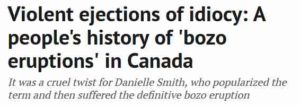
As Stuart Thompson has written in The National Post …
It is a surefire rule of politics that at any given moment, somewhere in Canada a bozo is about to erupt.
Just as a political campaign is looking to flip the script, or turn the corner, or recapture the narrative, some bozo will ruin it for them, prompting damage control, tearful apologies, or, in the most severe cases, a resignation.
The bozos simply can’t stop themselves from erupting.
Conservative strategist Tom Flanagan, who ran Smith’s 2012 campaign, oversaw one of the most memorable stretches of bozo eruptions in Canadian political history: Smith wanted a big tent party, and open and unvetted candidate nominations.
Two days after the 2012 election was called, a Wildrose candidate’s year-old blog post was unearthed declaring that all gays were destined for a “lake of fire”. Smith refused to rebuke her candidate, saying the party “accepts a wide range of views.” And the hits just kept on comin’ for the Wildrose campaign, as day after day after day, a new candidate bozo eruption garnered front page coverage, and the lead story status on the evening news.
Danielle Smith’s dreams of becoming the Wildrose Premier were dashed, the party 20 points behind their polling on Election Day.
What does the above have to do with British Columbia’s upcoming Saturday, October 19th provincial election, and the outcome of the election?
Kevin Falcon’s B.C. United Party has gathered disturbing information on several of the B.C. Conservative Party candidates running for office, including …
4/ Courtenay-Comox candidate Damon Scrase compared child vaccinations to Mayan sacrifices as recently as 2021. Does John Rustad also believe that? pic.twitter.com/ZsKI6lLVe9
— BC United (@voteBCUnited) March 21, 2024
5/ Surrey-Cloverdale candidate Jody Toor calls herself a doctor but holds a degree from a pseudo-science degree mill university in Hawaii called “Quantum University”, linked to a US federal fugitive. https://t.co/SGH5cUHLGC.
— BC United (@voteBCUnited) March 21, 2024
Need we say that the 38th British Columbia provincial election hasn’t even begun, and already John Rustad’s B.C. Conservative Party is experiencing unfortunate and devastating candidate destroying “information” aka “bozo eruptions”.
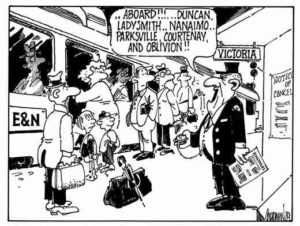
Now, this is not VanRamblings’ first rodeo.
We’ve worked on and written about municipal, provincial and federal campaigns for office for the past 61 years, and we’re here to tell you that the unvetted, looney tunes grab bag of B.C. Conservative Party candidates for office will from the day the Writ of Elections is dropped on Saturday, September 14th, through until Election Day on Saturday, October 19th, be subject to one B.C. Conservative Party-destroying bozo eruption after another.
Doesn’t mean to say that the B.C. Conservatives won’t win a handful of seats, mostly up north, or if British Columbians continue to dislike the cut of B.C. United Party leader Kevin Falcon’s jib, that the B.C. Conservatives could form the official opposition. But form government post October 19th?
Never. Not in a million Sundays.
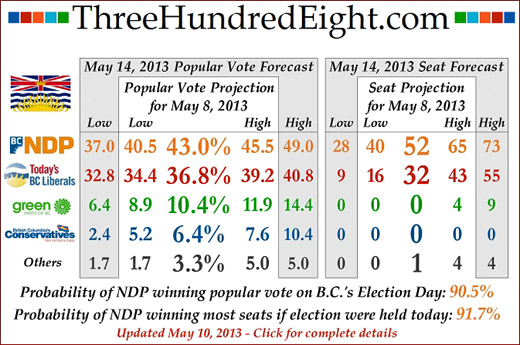 |
The final projected popular vote count heading into 2013’s British Columbia election, giving Adrian Dix’s BC NDP a comfortable majority government couldn’t have been more wrong. Instead the final seat count on Election Night looked like this …

So, what happened that changed Adrian Dix’s political fortunes from projected Premier to also run status, and Opposition party leader?
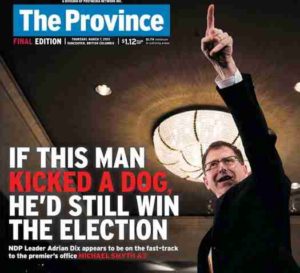
Three things …
- Maple Leaf Strategies pollster Dimitri Pantazopoulos. The longtime Stephen Harper pollster sent his team out to British Columbia six months in advance of the 2013 election. Here’s what Mr. Pantazopoulos advised Premier Christy Clark, and her campaign manager, Mike McDonald … “Focus on the 50 winnable seats. Ignore the 35 ridings where BC Liberals will never win a seat. Run a riding-by-riding campaign in each of those 50 ridings, where we’ll do intensive polling each evening, such that at the outset of each day, the candidate in the riding can speak to the issue of the day, the one that will get her or him elected to Victoria on voting day. Pour all of the party’s resources into those 50 ridings, and come Election Day, the BC Liberal Party will form government for the fourth consecutive time.” When Mr. Pantazopoulos made the suggestion, with some reluctance — given that the party was mired at 26% in the polls, a full 21 points behind the BC NDP — Ms. Clark and Mr. McDonald adopted Mr. Pantazopoulos campaign strategy;
- On Earth Day, April 22nd, 2013 while on the campaign trail in Kamloops, BC NDP leader Adrian Dix arbitrarily and unilaterally announced a new environmental platform, reversing a decade of BC NDP environmental policy, stating “Under my leadership, the BC NDP reaffirms our party’s opposition to the Northern Gateway Pipeline and offshore oil exploration.” The announcement made environmentalists in the party ecstatic, but disappointed and angered BC NDP shadow environment critic John Horgan, not to mention whole swaths of the party’s union supporters. The BC Liberal Party used this reversal of BC NDP environmental policy by running a series of hundreds of weathervane ads that devastated the BC NDP campaign;
- Although in 2013 BC NDP leader Adrian Dix campaigned with vigour, Mr. Dix performed poorly on both the province-wide televised debate, and the subsequent Leaders’ Debate on CKNW, appearing confused and unprepared, his style halting and uncertain, in contrast to a vibrant and schooled Christy Clark. So, yes, campaigns count, and can impact on an election outcome. As can an effective campaign strategy, and a well-experienced campaign team. And money, of course, for those saturation radio and TV ads, particularly in the latter two weeks of the campaign.
In some ways, the coming provincial election is a crapshoot. Anything could happen. Who knows what will transpire during the 35-day election campaign?
The above said, the campaign strategy, experienced campaign team, the well-vetted candidates for office running in the 93 ridings across the province who won’t be given to bozo eruptions that will devastate their campaign for office, and the flush with money ads to saturate the airwaves throughout the campaign that the BC Conservative Party simply does not, and will not, have … well …

A lack of resources hardly makes for a winning BC Conservative election campaign, whatever the outcome of the election on October 19th.
